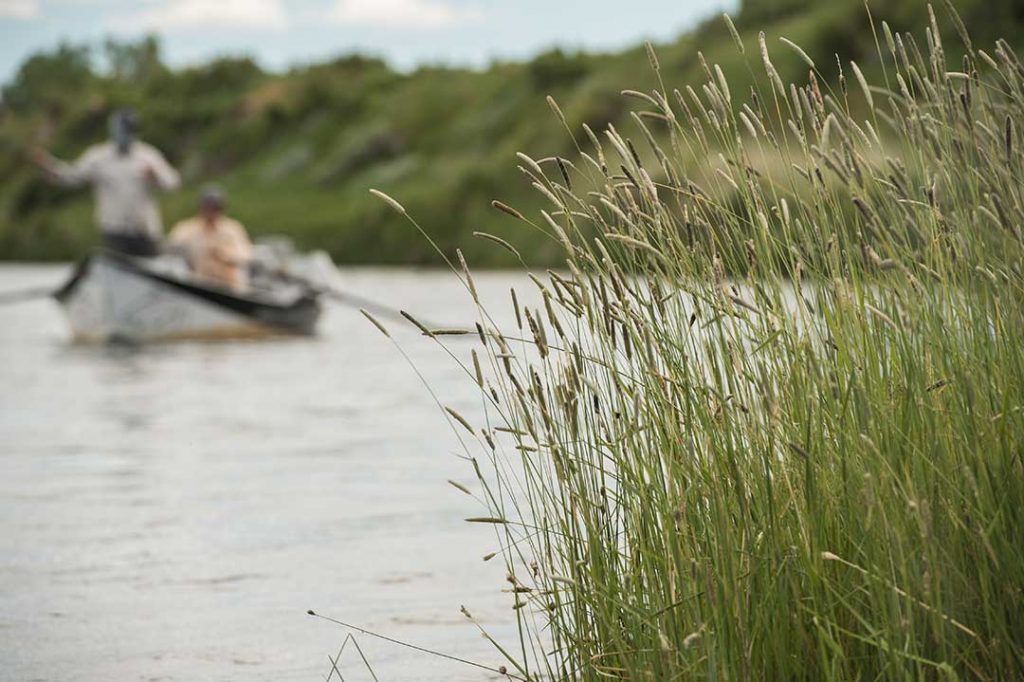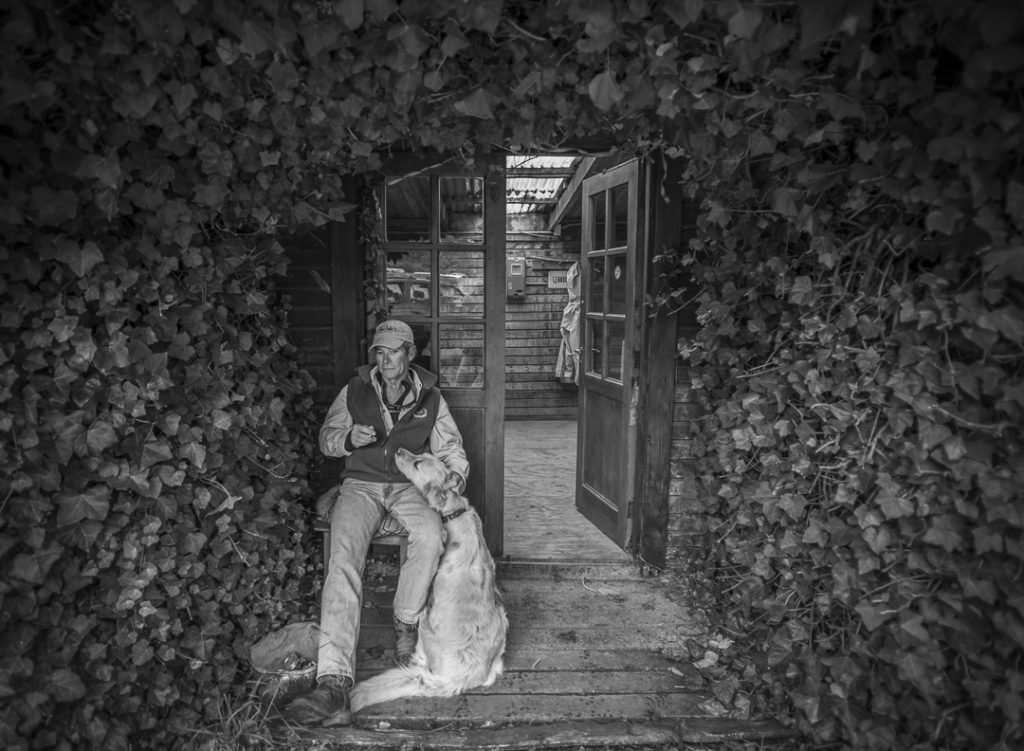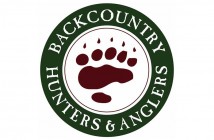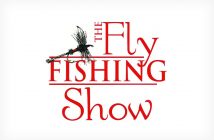
Of course there are… but the game has changed.
By Kirk Deeter
In 2002, I co-authored a book titled Castwork with my cousin Andrew Steketee (photos by Andrew’s sister Liz Steketee). It never got much commercial traction, and never made any of us money. But it became somewhat of a cult classic (think garage band), got noticed by the editors of Field&Stream, and ultimately became the catalyst that launched me down my path of writing and editing stories about fly fishing as a living. Coincidentally, it also triggered Simms to embrace that black-and-white guide-centric brand image.
Guides are the gatekeepers, the professors and coaches. I said it before and will say again that I think the sun rises and sets on the fly-fishing industry where guides say it does.
I like to think the one thing that Castwork earned me was a Ph.D. from the University of the River, leaning on the words and lessons from the likes of Terry Gunn, Patty Reilly, Denny Breer, Dave Faltings, Tim Mosolf, Kea Hause, Pat Dorsey, Rusty Vorous, John Flick, Bob Lamm, Dan Stein, Pete Cardinal, and Kim Leighton. Sad to say, almost half of those great mentor guides are gone now. But I think about all of them, and the lessons they taught me, every time I hit the river.
The other day, Steketee and I were chatting, and he asked me: “Do you think we could even do a book like Castwork, in this day and age?” Are there really any great guides left anymore?
I thought about it a bit, then I answered yes, of course! But I don’t think we’d want to do a book like that anymore because the guiding world has changed quite a bit in the past 20 years. There is amazing passion and talent out there. Great, gritty stories. But the role many guides are playing isn’t what it was. For some of them (and me) it can be downright depressing.
We live in a world of instant gratification. We live in a world of numbers, by any means necessary. There’s more pressure from the manufacturers to sell their stuff, and the measuring stick they use is how many fish someone can catch. My favorite guides have always been the ones who can actually teach people how to use that stuff.
Media has changed. I recently threw a personal thought on Facebook, where I said that paying for a guide trip, and ONLY watching a bobber all day was kinda like paying for a ticket to a hockey game, and only watching the Zamboni resurface the ice in between periods. That wasn’t an indictment of the bobber… it was an indictment of laziness.
But I did get a handful of pissed-off responses from guide friends, some warning me to mind my tongue.
They said things like, “Hey man, I am only doing what my client wants to do, and if they want to catch as many fish as they can, that’s what I have to do…”
Okay.
Fine.
But at that point, are you really a “guide” or are you just a valet in waterproof pants?
I’m just asking. Because all the best guides I know are teachers, foremost, and also stewards of the resources. Shepherds of the flock.
Angling pressure is as much a conservation concern these days as climate change, pollution, or anything else. How we fish, and respect for others, is the key to the future success of this sport.
I am inspired by the young moxie. I am hopeful. But I am also disgusted by the commercial circus on many rivers that were once considered sacred. And I can only hope that a new generation of guides can steer people toward the true essence.
So I don’t put all the trout-hammering problems on the guides.
I put most of it on the companies that shape this industry and profit by fueling as much consumption as possible. I put it on media (myself included) also. And it’s time for all of us to stop ignoring the elephants in the room, stop scapegoating guides and outfitters, and instead evolve as an industry, set some standards and collaborate on problem solving.
There, I just dropped the puck. Let’s see if a hockey game breaks out.
I would be remiss if I did not mention that the fishing and guide world lost a legend, recently. Monte Becker died in Iliamna, Alaska, this month. He was the best I have ever seen behind the oars of a drift boat, and as an expat in Chile, carved through rivers that had not been explored that way before. On our first international magazine assignment together, nearly 20 years ago, Tim Romano and I visited the Coyhaique region of Chile, and the first person we fished with (for several days) was Monte Becker. He remained an inspiration ever since, and we express our deepest sympathy to his family and many friends. Indeed, there might not ever be another quite like Monte Becker.

Monte relaxing at his home in Coyhaique – 2015 – Photo Tim Romano



8 Comments
Of course there are many great guides left. Locally, there are many disciples of Kea Haus who work at my shop and others. He was a mentor to me as well, who told me once that a guide isn’t doing their job unless they eventually phase themselves out of a job (because we are teachers). Unless of course, you have the client who wants you to row them down the river over and over again.
You know how to ruffle feathers. What’s more to blame is an environment where fly fishing events are now held at sports stadiums by big city shops that try our rivers like infinite resources. Mr. Deeter–you never replied to me about that one, nor about the fly shop sources where you get your info and are supposedly in contact with all the time.
The word “try” in the 2nd paragraph was meant to be “treat”—Treat our rivers like infinite resources. They are not that–our fishable waters are shrinking in spite of the constant direct to consumer marketing by certain brands who treat our waters and our market as infinite resources.
Yes! There are a few good guides. But it’s going downhill fast. Bobbers and numbers are killing the sport. Many guides feel they have the right over DIY anglers and have no problem getting in their way. Guides constantly talk bad about anyone who isn’t fly fishing and yet they rely on “bob” to fill their boat. They give the sport of fly fishing a bad rap. Many new ultra-light guys are getting into fishing and seeing this first hand. Several have told me they have no interest in joining a so called elite club. One was even outright mad at how many guides just toss fish back into the water without ever teaching careful handling of the fish. Guides let their clients fight fish way too long. So we have ultralight guys calling fly guides dirty. The sport is changing!
Dead on . . . too many guides are 9-5 slackers just rowing the boat and demanding exorbitant tips on top of over $500 daily rates. If a guide doesn’t teach me several things I didn’t know, then I’ve wasted my money and the day.
While others may have different expectations, I want patience, knowledge, expertise on the river, regional history and insight and a guide who doesn’t smoke or get on my nerves.
If your guide has a brand new Tundra, brand new boat and the latest gear, you are likely in trouble. I pay for knowledge, coaching and the experience, catching fish is always a bonus. Too bad there aren’t tiers of guides so the novice has to earn his stripes and gain experience to become a master guide.
Kirk, Lots to unpack here from all sides of your article and the subsequent responses, but I appreciate your introduction of this important and relevant subject. There’s lots of blame to spread around and as a guide I am likely as guilty as any. At the same time, having worked in most parts of this industry, I agree with your assessment of the importance of guides. I do however take issue with jabs that it’s no longer a noble profession or that we have just become bobber tossing valets. Frankly that’s horseshit, and there is incredible creativity, professionalism, talent and passion wherever I look around this country. Your somewhat inflammatory remarks raise a good issue that we might need to raise our own personal bars as teachers or stewards. This I take to heart. I also know legions of other guides who feel the same way.
Could it also be Kirk that you have let a bit too much water flow beneath the bridge since your guiding past? Maybe a refresher on your part might serve to clarify?
My offer is this. Let’s trade jobs and write about it. You come here and guide for a week or two and write about it and I will endeavor to help you and Tim with more content for angling trade.
I happily returned to guiding after time away and perhaps you should also. With friendship and respect Frank Smethurst
I’d argue that there are still a handful of legendary guides out there, and some truly great guides in their prime, and a younger generation of greatness just getting started…..but most of them aren’t chasing trout. They’re working the salt.
A saltwater guide *must* teach fundamentals AND know their waters intimately AND be a competent boat captain AND have great eyes AND work their ass off if the (average) client is going to catch ANY fish whatsoever. Unlike the modern trouty numbers game, a single fish might make an entire week successful.
The sport *is* changing, and the future isn’t trout.
Great comment Kirk. Speak with friends about this topic often. You are spot on.
Kirk,
Good article on the guide profession. There are many guides left in the profession who are good teachers, coaches, therapists, refeeres, advisors, naturalists, and anglers. Even though the fly fishing world is becoming less trout centric, there are places like the Driftless Area of Wisconsin where the trout fishing and guiding really shines. While we do some indicator fishing here, guides need to be well versed in dry fly fishing and hatches, streamer fishing, terrestrial fishing, soft hackle fishing, and Euro nymphing. In addition to this, we have to know several different streams and their individual characteristics intimately, not just 1 or 2 rivers. We also have to fish these techniques in both wide open and overgrown confined spaces with client abilities from novice to experienced at various ends of the learning curve. We also have to work with a varying degree of physical condition-this is a walk-wade fishery that can involve covering a couple miles of stream in a day. Good guides in the Driftless area have to be good teachers, be able to assess each client’s ability-casting and physical-, and show this person a good time and value based on what they have to work with that day. Many of these guides myself included have spent decades honing their skills and craft. At the end of the day we are providing a service that includes a learning and fishing experience, a nature tour, and a form of entertainment-not just fish numbers. You’re welcome to come back to the Driftless Region of southwest Wisconsin and fish anytime.
Cheers,
Craig Amacker
Madison Fly Fishing Company